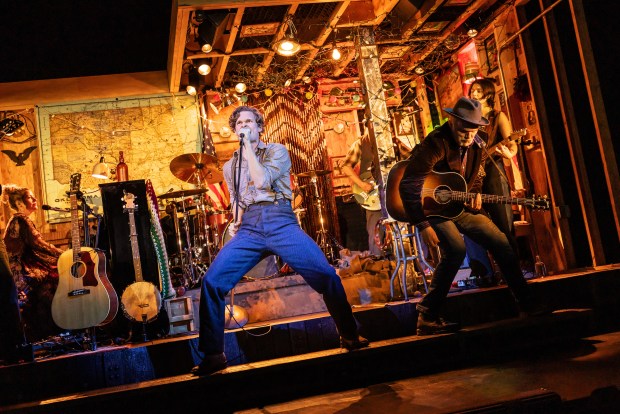NEW YORK — Most great Broadway musicals are about mortality. From “Les Misérables” to “The Lion King,” they preach that we don’t die but live on in another form.
But very few Broadway musicals are about corpses.
Actually, I’d venture that’s a genre of precisely one musical (well, arguably two if you include “Fun Home,” set partly in a funeral home). Now landing in the dog days of the 2024-25 Broadway season, “Dead Outlaw” is a deliciously sardonic little tuner from the cheerfully nihilistic, ever anti-sentimental, ever macabre team of David Yazbek (music, here alongside Erik Della Penna), Itamar Moses (book) and David Cromer (direction).
Cromer has turned his Broadway attention from the Hollywood superstar George Clooney in “Good Night, and Good Luck” to a mummified dude in a matter of days and coaxed decent if understated performances from both.
Marketers for “Dead Outlaw,” a decidedly unlikely Broadway attraction that has moved uptown from the Minetta Lane Theatre with original cast intact, have focused on the novelty value of a musical about a dead body, but that really doesn’t tell you much, even if the first titled number in the show goes, helpfully, by “Dead.” (Investing in this show sure took some guts.)
The singing corpse in question here is that of real-life outlaw, a man vividly named Elmer McCurdy, born in Maine in 1880 and variously a plumber, lead miner and boozer who decided that robbing banks and trains was a more lucrative way to pay for his whiskey. In 1911, following his holding up a Katy Train, or what McCurdy thought was a Katy Train, he got himself shot dead by a sheriff’s posse. Dead, but not buried until 65 years later.
Luckily for Andrew Durand, who plays McCurdy, we see some of the story of the living McCurdy, as musically narrated by the macho Jeb Brown, leading a fiery on-stage country-rock band. We watch Elmer rob and drink and see his failed relationship with a young woman (quirkily but plaintively played by the terrific Julia Knitel).
But most of “Dead Outlaw” is about dead Elmer’s body, which for a variety of amazing-but-true reasons does not actually make into the ground for decades, instead being profitably embalmed, mummified and exploited by a variety of hucksters, carnies, businessmen and believe-it-or-not entrepreneurs until the actual living history of the corpse had been forgotten (there’s a sting in the show’s tail I won’t reveal).
As he sings, looking and acting like the late Brian Dennehy, only with a better voice, Brown keeps reminding us, dryly, that we’re watching a true story. For good reason. It’s that improbable.
Along the way, there is some comedy so dark only a mortician could fully appreciate the gags; indeed, one coroner (played with giddy abandon by Thom Sesma) has one of Yazbek’s most enjoyable tunes to sing, a self-actualizing number that you imagine is pent up inside every buttoned-down medical examiner.
Of course, the setup here requires Durand to play dead for great swaths of the show.
Sans visible breath, he twitches not a stitch, even twisting his digits into the kind of weird position one imagines comes easily to a corpse. At one point, Cromer and his gifted Chicago-based lighting designer, Heather Gilbert, combine for what must be the best lighting cue of the entire Broadway season as a pinhole spot lands on Durand’s face for what feels like several minutes as the audience holds its breath, not knowing whether the corpse will speak, stay dead or break into song, the show fully understanding the possibilities posed by the magic of theater. It’s consummate Cromer and indicative of a highly unusual and highly skilled performance by a very game actor who also sings beautifully while his character is alive.
This craziness apparently was Yazbek’s idea. He and Della Penna (best known as Natalie Merchant’s guitarist) have a lot of fun with their internal rhymes and by contrasting gorgeous music of romantic longing with characters who have no actual access to their own feelings. But when combined with Moses’s very shrewdly toned book, the show does explore substantial themes, beyond its immediate purpose of persuading an audience not just to confront the certainty of their own death (always fun on a Saturday night) but their own corporal decay. The show notes that nothing ever was truly sacred or revered on the American frontier, the living and the dead all attracting their price, all susceptible to transactional exploitation. The notion lingers that not so much has changed.
I’ve no idea how the modestly scaled, 100-minute “Dead Outlaw” will fare in the Midtown marketplace, or if enough of the touristically curious will eschew the familiar and abandon the reliably living for a gander at the truly distinctive.
If you choose the one with the corpse, know that this weird show is very much alive.
Chris Jones is a Tribune critic.
cjones5@chicagotribune.com
At the Longacre Theatre, 220 W. 48th St., New York; deadoutlawmusical.com




